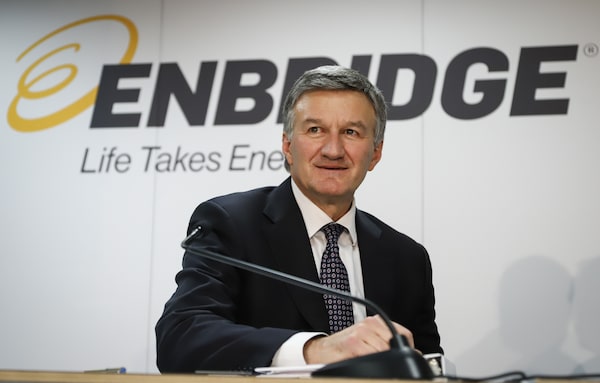
Enbridge chief executive Al Monaco prepares to address the company's annual meeting in Calgary, Wednesday, May 8, 2019. Enbridge Inc. says Monaco will retire effective Jan. 1, 2023, and be replaced by Greg Ebel, currently the company's board chair. THE CANADIAN PRESS/Jeff McIntoshJeff McIntosh/The Canadian Press
Al Monaco was at a senior leadership meeting with Enbridge Inc. ENB-T executives in Houston on Monday morning when he shared his news – he was retiring as head of the Calgary-based energy company after a decade at the helm.
His colleagues seemed surprised, he told The Globe and Mail via phone a few hours later, “but we’ve got a great company and an excellent team, so we’re not going to miss a beat.”
Mr. Monaco – who spent 27 years at Enbridge – will wrap up as chief executive officer on Jan. 1, 2023. On his watch, the midstream energy company expanded its liquid pipeline business into the U.S. Gulf Coast, executed a $37-billion merger with Spectra Energy to create North America’s largest energy infrastructure company, saw cash flows rise by about 16 per cent and dividends grow by 13 per cent annually. But he also had to contend with a tumultuous time for pipelines, including the battle over the cancelled Northern Gateway line, the controversial Line 3 project and the continuing legal fight with the State of Michigan over the cross-border Line 5.
He will be succeeded by current board chair Greg Ebel, who comes to the top job with two decades of energy sector experience, and was the CEO of Spectra in 2017 when it merged with Enbridge. With an entire career spent in the energy sector, Mr. Ebel comes with what Mr. Monaco called “very deep industry knowledge.”
As board chair – a role he’s held since 2017 – Mr. Ebel is also intimately familiar with the company’s strategy. His main residence will be in Houston with his family. Mr. Monaco emphasized that Enbridge’s corporate offices will remain in Calgary, but said with the massive amount of travel that the CEO role involves, “it’s less relevant where you actually hang your hat.”
In a statement, Mr. Ebel thanked his predecessor for his service, and said he would continue to move the business forward “with a consistent focus on the energy transition, capital allocation, safety, integrity, inclusion and high performance.”
Casting his mind over his highlights as CEO, Mr. Monaco pointed to Enbridge’s improvements in safety and reliability, and its expanded export capacity. The company’s asset mix also changed markedly during his tenure, altering the core of its strategy.
“If you look back 10 years ago, we were primarily a crude business. Today, we’re much more than that,” he said.
Enbridge has taken on a huge position in natural gas, for example, but it has also expended its renewable-power portfolio.
“I’m sure glad we pushed the renewables business hard,” Mr. Monaco said. “Back when I started my current role, people would ask me, ‘Why are you in the renewables business?’ And I think that’s been borne out now. We don’t get that question anymore. We get questions like, ‘How fast can you grow this business?’”
But he also pointed to some lost opportunities for the Canadian energy sector. That includes the Northern Gateway Pipeline, a $7.9-billion project to build two 1,177-kilometre pipelines between Bruderheim, Alta., and a crude supertanker terminal in Kitimat, B.C. It would have delivered about 520,000 barrels a day of oil sands bitumen and other types of oil to be shipped to Asian markets.
The project had 33 Indigenous partners along the route that would have been 33 per cent co-owners of the project. But the federal Liberal government directed the National Energy Board to dismiss the application in 2016, saying it wasn’t in the public interest.
“Canada missed an opportunity there to really advance reconciliation, to advance how business should be done,” Mr. Monaco said, calling the cancellation of the project a “disappointment.”
Last week, six years later, Enbridge signed a deal with a consortium of 23 Indigenous communities who will own an 11.57-per-cent stake in seven Enbridge pipelines that serve the oil sands, in a $1.12-billion deal that represented the largest energy-related Indigenous economic partnership transaction in North America.
The deal will have an “outsized impact” in guiding the way Indigenous partnerships with the energy sector are built, Mr. Monaco said on Monday, but that could have happened earlier had Gateway gone ahead.
Another challenge during Mr. Monaco’s time at Enbridge has been the growing opposition to midstream companies in Canada’s oil and gas sector. They’re the ones that physically carry fossil fuels, and Mr. Monaco believes that makes them vulnerable to attack.
And while he’s proud of Enbridge’s record on standing up for the energy sector, he also feels that “sometimes we’ve been unable to communicate our story well, in terms of how important our role is in supporting the economy.”
“I wish that sometimes we had done a better job than that,” he said.